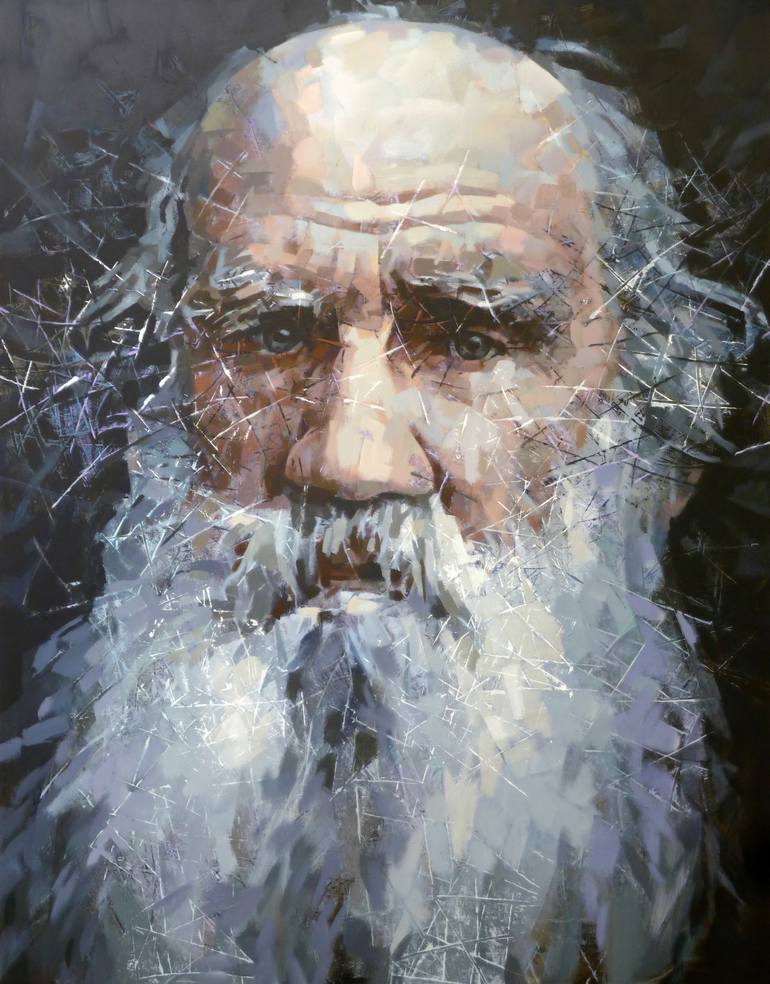Leo Tolstoy Archive
Written: 1887
Source: Original Text from Gutenberg.org
Transcription/Markup: Andy Carloff
Online Source: RevoltLib.com; 2021

As soon as all was quiet, Polikéï, like one engaged in some guilty deed, quietly slipped down from the stove, and began to make ready to depart. It somehow seemed to him a trying task to spend the night here with the recruits. The cocks were already calling to each other.
Barabán had eaten all his oats, and was stretching after water. Ilyitch harnessed him, and led him out past the teams of the muzhíks. His cap with its precious contents was safe, and his carriage-wheels were soon rolling anew over the frosty Pokrovskí road. Polikéï began to breathe more easily as soon as he got out of the city. At first, somehow, it seemed to him that he heard some one right behind him, following him; it was as though they stopped him, and bound his hands behind him instead of Ilya, and to-morrow he would have to go to camp. It was neither from the cold nor from terror that a chill struck down his back, and he urged and urged Barabán to his utmost endeavor. The first man whom he met was a priest in a high winter cap, walking with a one-eyed workman. Polikéï grew even more troubled. But as he left the city behind, this terror gradually diminished. Barabán proceeded in a slow walk. It grew lighter, so that it was possible to see the road before him. Ilyitch took his cap, felt to see that the money was all right. "Shall I put it in my bosom?" he queried. "I should have to untie my girdle. Now I am coming to the hill. I'll get out* of the telyéga when I get there. I'll be careful. My cap fits tight, and it can't slip out from under the lining, and I won't take off my cap till I get home."
When he came to the hill, Barabán, in his peculiar trot, dashed up the slope; and Polikéï, who, like the horse, felt a strong desire to get home, did not hinder him in his endeavor.
Every thing was in order, or, at least, seemed to him so; and he gave free course to his imagination in respect to his mistress's delight, and the five-silver-ruble piece which she would give him, and the joy of his family. He took off his cap, once more felt of the letter, crushed his cap down closer to his head, and smiled. The wool on his cap was rotten; and for the very reason that Akulína, the day before, had carefully sewed the torn place, he tore the other end; and the very motion that Polikéï made when he thought that he was pulling down the envelope with the money closer under the wool,—that same motion tore away the cap, and, gave the envelope a chance to escape from one corner under the pelt.
It began to grow light, and Polikéï, who had not slept all night, grew drowsy. Adjusting his cap again, and still more loosening the envelope, Polikéï leaned his head on the side of the wagon, and drowsed.
He woke up just as he reached home. His first impulse was to feel for his cap: it was firm on his head. He did not take it off, being convinced that the envelope was there. He whipped up Barabán, adjusted the hay, again assumed the dignity of a householder, and, looking around him with an air of importance, rattled up toward his home.
There was the cook-house, there the wing, there the joiner's wife hanging out her wash, there the offic* e; there the manor-house, where, in a moment, Polikéï would give proof that he was a faithful and honest man, "for any man can be slandered," and the mistress would say, "Well, thank you, Polikéï, here's three—or maybe five, or maybe even ten—silver rubles for you;" and would have some tea brought to him, and perhaps some spirits besides. It would not come amiss after the chilly ride. "And with the ten rubles we'll have a holiday, and buy some boots, and pay back Nikíta the four rubles and a half, since he's begun to dun me for them."
Not driving the two hundred steps that remained, Polikéï straightened himself up, tightened his belt, adjusted his collar, took off his cap, smoothed his hair, and with confidence thrust his hand under the lining. His hand moved more and more nervously; he inserted the other also. His face grew paler and paler. One hand came out on the other side.... Polikéï fell on his knees, stopped the horse, and began to search all over the telyéga, the hay, the bundle of purchases, to feel in his bosom, in his overalls. The money was nowhere to be found.
"Mercy on me![15] What does this mean? What will be done to me?" he roared, tearing his hair.
But just then, remembering that he might be seen, he turned Barabán around, put on his cap, and drove the astonished and reluctant animal up the road again.
"I can't bear to have Polikéï drive me," Barabán must have said to himself. "Once in my life he has fed me and watered me in time, and just for the sake of deceiving me in the most unpleasant manner. How I put myself out to get home! He stopped me, and just as I smelled our hay, he drives me back* again."
"You devilish good-for-nothing beast!" cried Polikéï through his tears, standing up in the telyéga, and sawing on Barabán's mouth, and plying the whip.